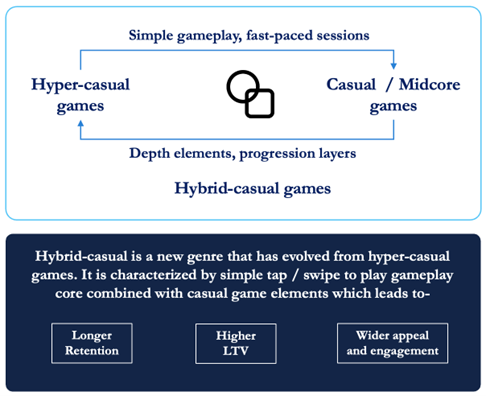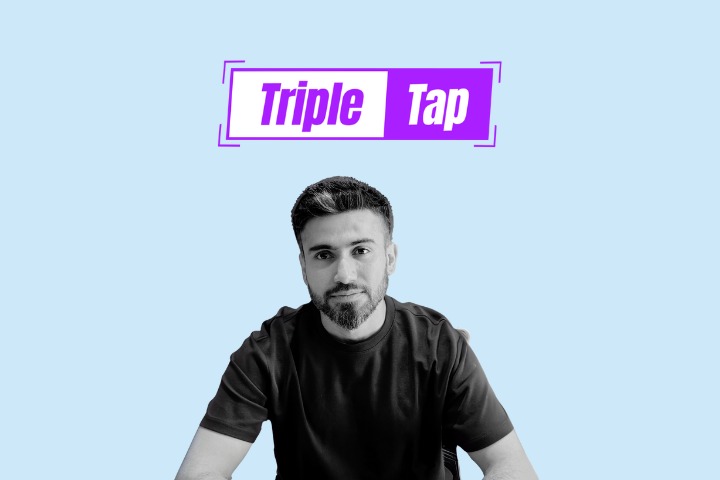Founder: Karan Khairajani
You might remember games like Temple Run (2011) and Subway Surfers (2012)—two instantly recognizable endless runner games. Then came Flappy Bird (2013), which skyrocketed to over 50 million downloads in less than a year. These games represented a new wave of highly intuitive, instantly playable, and addictive experiences that would later be classified as hyper-casual games. With their simple tap-and-swipe mechanics and straightforward core loops, they were perfect for passing idle time—whether commuting home or waiting in line, effortlessly playable with just one hand.
Over the years, hyper-casual gaming became a category of its own, fuelling massive growth in the mobile gaming industry. By 2018, hyper-casual games dominated global download charts, thanks to their low CPIs and broad appeal. This boom, particularly between 2017 and 2020, was best exemplified by Voodoo Games, which scaled its revenue from $1 million to $400 million in just two years, driven by its hyper-casual portfolio.
However, the low barriers to entry and lower CPIs made hyper-casual gaming attractive to developers, leading to an explosion of competition. As a result, user acquisition costs surged, clones of successful games flooded the app stores, and developers struggled to build differentiated experiences. With rising acquisition costs and diminishing monetization opportunities, the hyper-casual era started to fade.
Enter Hybrid-casual games
Hybrid-casual games blend the accessibility of hyper-casual titles with the depth and progression of mid-core games. They retain the easy-to-pick-up mechanics of hyper-casual games but introduce more engaging gameplay loops, progression systems, and monetization strategies. Games like Archero, Stumble Guys, and Project Makeover exemplified this shift, topping download charts while solving hyper-casual gaming’s monetization challenges through a balanced mix of in-game ads and in-app purchases.

Hybrid-casual games solved for the retention problem of Hyper-casual games resulting in games with a longer shelf life. While both hyper-casual and hybrid-casual games have ideal D1 retention in similar ranges, Hybrid-casual one-ups hyper-casual games when it comes to D30 retention which almost tends to 0%.
Hybrid-casual games and the Indian gaming market
We believe hybrid-casual games present a massive opportunity—both as a growing market in India and as a chance to develop global hits from India. Despite the dominance of puzzle, ludo, and rummy games, hybrid-casual remains an underexplored category among Indian studios, with only a handful actively focused on it. This whitespace presents a unique opening for innovation and growth in the industry.
Why we invested in Triple Tap Games?
At Kalaari, we back founders who bring unique insights about the market. From our first conversation, Karan’s sharp focus on the ideas he wanted to pursue and his structured approach to execution stood out.
Karan embarked on his journey in the gaming industry 12+ years back, working on various projects. His first major success came with All in a Day’s Play, a bootstrapped studio that operated profitably, with games amassing over 20 million downloads.
In 2018, Karan Co-founded Firescore Interactive, driven by a vision to create hyper-casual games for a global audience. Firescore launched multiple games, eventually finding success with hit titles like Soap Cutting and Acrylic Nails.
In 2021, CrazyLabs acquired Firescore Interactive. Over their lifetime Soap Cutting, Acrylic Nails, and Hair Dye have collectively surpassed 400 million downloads.
At Triple Tap Games, Karan is backed by a core team that has been with him since the early days of Firescore Interactive. The team’s experience in hyper-casual gaming enables them to build games that are highly playable, instantly engaging, and addictive. This approach helps them avoid long development cycles while ensuring cost-efficient game production.
Additionally, Triple Tap is already integrating AI into their workflows and tools to further streamline development and reduce costs.
Karan Khairajani – Founder, CEO of Triple Tap Games commented – “Our team (Siddhesh Dhopatkar, Ravish Dhanawde, Hari Saurabh Singh, Makhmoor Syed, Harshad Joshi and Peter Pawan), with over a decade of experience in the gaming space, is uniquely positioned to understand what players want. By leveraging AI, we’re building an extensive content pipeline to deliver truly engaging experiences. We’re grateful for the support of our distinguished VC funds and angel investors.”
Harshit Kumar, AVP at Kalaari Capital said – “Karan is one of the rare founders who brings deep passion and unique insights into the gaming market. His experience of building global games has equipped him to push boundaries and craft engaging experiences for players worldwide. We’re thrilled to partner with Triple Tap as they bring world-class hybrid-casual games to life — building from India, for the world.”
We believe Triple Tap Games is uniquely positioned to capitalize on the growing trend, leveraging their expertise to build engaging, revenue-generating hybrid-casual games. We are excited to co-lead this investment with Eximius Ventures and other prominent angel investors from the entertainment and gaming community.
Kalaari Capital is an early-stage, technology-focused venture capital firm based out of Bengaluru, India. Since 2006, Kalaari has empowered visionary entrepreneurs building unique solutions that reshape the way Indians live, work, consume and transact. The firm’s ethos is to partner early with founders and work with them to navigate the inevitable challenges of fostering ideas into successful businesses. At its core, Kalaari believes in building long-term relationships based on trust, transparency, authenticity, and respect.
If you are a founder building an early-stage company, write to us at pitch@kalaari.com








